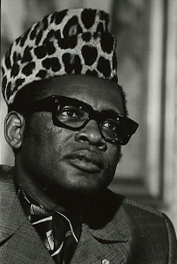Manifesto of N'sele on:
[Wikipedia]
[Google]
[Amazon]
 The Manifesto of N'sele (french: Manifeste de la N'sele) was a political document issued in the
The Manifesto of N'sele (french: Manifeste de la N'sele) was a political document issued in the
 The Manifesto of N'sele (french: Manifeste de la N'sele) was a political document issued in the
The Manifesto of N'sele (french: Manifeste de la N'sele) was a political document issued in the Democratic Republic of the Congo
The Democratic Republic of the Congo (french: République démocratique du Congo (RDC), colloquially "La RDC" ), informally Congo-Kinshasa, DR Congo, the DRC, the DROC, or the Congo, and formerly and also colloquially Zaire, is a country in ...
(later renamed Zaire
Zaire (, ), officially the Republic of Zaire (french: République du Zaïre, link=no, ), was a Congolese state from 1971 to 1997 in Central Africa that was previously and is now again known as the Democratic Republic of the Congo. Zaire was, ...
) on 19 or 20 May 1967 which set out the official political stance of the Popular Movement of the Revolution
The Popular Movement of the Revolution (french: Mouvement Populaire de la Révolution, abbr. MPR) was the ruling political party in Zaire (known for part of its existence as the Democratic Republic of the Congo). For most of its existence, it wa ...
(''Mouvement Populaire de la Révolution'', MPR), a political party
A political party is an organization that coordinates candidates to compete in a particular country's elections. It is common for the members of a party to hold similar ideas about politics, and parties may promote specific ideological or p ...
which had been founded by Joseph-Désiré Mobutu
Mobutu Sese Seko Kuku Ngbendu Wa Za Banga (; born Joseph-Désiré Mobutu; 14 October 1930 – 7 September 1997) was a Congolese politician and military officer who was the president of Zaire from 1965 to 1997 (known as the Democratic Republic o ...
in 1966. The manifesto was created at an MPR meeting in N'sele, Kinshasa where it was based.
The Manifesto of N'sele defined the ideological position of the MPR as a combination of " Authenticité" and "Mobutism
Mobutism (french: Mobutisme) or Mobutuism (french: Mobutuisme) was the state ideology of Zaire (present-day Democratic Republic of the Congo) during the latter half of the 20th century, when it was under the one-party rule of the Popular Movement ...
". It defined Mobutism as an expression of Congolese nationalism, the rejection of tribalism
Tribalism is the state of being organized by, or advocating for, tribes or tribal lifestyles. Human evolution has primarily occurred in small hunter-gatherer groups, as opposed to in larger and more recently settled agricultural societies or civ ...
and regionalism, and the abstract concept of "revolution
In political science, a revolution (Latin: ''revolutio'', "a turn around") is a fundamental and relatively sudden change in political power and political organization which occurs when the population revolts against the government, typically due ...
". Nationalism and the affirmation of independence was essential to the document. The Manifesto of N'sele also laid out the intentions of the government which included expansion of the national government's authority, a program committed to improving labour standards, maintaining economic independence, and the creation of an "authentic nationalism".Simpson, Andrew. Language and Nationality in Africa. Oxford University Press, 2008. Pp. 228 It legitimized the creation of a one-party state
A one-party state, single-party state, one-party system, or single-party system is a type of sovereign state in which only one political party has the right to form the government, usually based on the existing constitution. All other parties ...
in the country as an antipolitical means to end the political and ideological infighting which had characterised the Congo Crisis
The Congo Crisis (french: Crise congolaise, link=no) was a period of political upheaval and conflict between 1960 and 1965 in the Republic of the Congo (today the Democratic Republic of the Congo). The crisis began almost immediately after ...
(1960–65).
Importantly in the context of the Cold War, the Manifesto of N'sele repudiated both communism
Communism (from Latin la, communis, lit=common, universal, label=none) is a far-left sociopolitical, philosophical, and economic ideology and current within the socialist movement whose goal is the establishment of a communist society, a ...
and capitalism
Capitalism is an economic system based on the private ownership of the means of production and their operation for profit. Central characteristics of capitalism include capital accumulation, competitive markets, price system, priva ...
as not "authentic" Congolese ideologies. It called for a policy of "positive neutralism" in foreign policy.
References
Bibliography
* *External links
* * (Illustrated edition.) {{Authority control 1967 documents 1967 in politics 1967 in the Democratic Republic of the Congo African and Black nationalism in Africa Congolese nationalism (Democratic Republic of the Congo) Political manifestos Zaire